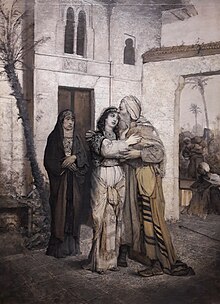| Nathan the Wise | |
|---|---|
 Recha Welcoming Her Father, 1877 illustration by Maurycy Gottlieb | |
| Written by | Gotthold Ephraim Lessing |
| Characters | Nathan, Saladin, Young Templar, Patriarch, Recha, Daja, Monk, Sittah, Al-Hafi |
| Date premiered | 14 April 1783 |
| Place premiered | Döbbelinsches Theater, Berlin |
| Original language | German |
| Setting | Jerusalem c. 1192 |

Nathan the Wise (original German title: Nathan der Weise, pronounced [ˈnaːtaːn deːɐ̯ ˈvaɪzə] ) is a play by Gotthold Ephraim Lessing from 1779.[1] It is a fervent plea for religious tolerance.[2] It was never performed during Lessing's lifetime and was first performed in 1783 at the Döbbelinsches Theater in Berlin.[2]
Set in Jerusalem during the Third Crusade, it describes how the wise Jewish merchant Nathan, the enlightened sultan Saladin, and the (initially anonymous) Templar, bridge their gaps between Judaism, Islam, and Christianity. Its major themes are friendship, tolerance, relativism of God, a rejection of miracles and a need for communication.
- ^ Cite error: The named reference
KirschTheWisewas invoked but never defined (see the help page). - ^ a b Dale, Geoff (June 17, 2019). "Stratford Festival review: A thought-provoking theatrical experience". Stratford Beacon-Herald. Retrieved September 5, 2019.